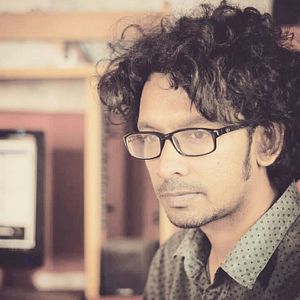The options for him were either exile or death. He chose the former. Ananya Azad, 25, left Bangladesh on a self-imposed exile to save himself from attack by Islamic fundamentalist forces, who have marked him as a top target. A decade ago Humayun Azad, his father, became the first victim for radical Islamists for his writings against fundamentalism. The young Azad has also faced constant threats on his life and he was one of the names on the list of 84 bloggers that Bangladeshi extremist groups have marked for targeting.
The Diplomat’s Sanjay Kumar spoke to Ananya Azad just a day before he left Bangladesh. An excerpt of the interview follows.
The Diplomat: Why you are leaving the country?
Ananya Azad: I am quitting the country as my life is under threat. It has become difficult for me to be normal. I write against fundamentalism, war criminals, religious intolerance. I write against those who use religion to misguide this society. As such, people think that my writing is harmful for them. That’s why they want to kill me. For the last few months, I have been living almost in hiding; I left my job, scaled down my writing, put my webpage on hold—for me life has lost its normalcy.
You are scared that if you stay back in Bangladesh you will be killed?
Yes. The present situation in Bangladesh is very uncertain. There is no security for anyone who writes against irrationalism and advocates secular values. The fundamentalists have already killed nine bloggers who have been fighting for free thought. There are many writers, bloggers, and editors who are on the hit list of the fundamentalist forces for writing against Islamic extremism. The government is doing nothing to protect the lives of these bloggers. The bloggers are living in constant fear and there is no attempt by the regime to address their security.
Why do you think the government is not able to protect you and other bloggers?
There is no law, there is no justice and the government does not stand by secular forces. It seems as if they are in cahoots with the killers. Despite open threats to writers and bloggers, the government is not able to rein in fundamentalist groups.
The condition inside the country is not good. Maybe fundamentalist forces and the government are working in tandem. That’s why the police buy the argument that the bloggers are atheist and should be targeted. Why someone should be killed for having an independent mind about religion and politics? This is not a sign of good politics. I think day by day the condition of this country is getting worse and there is an urgent need to intervene and restore the fundamental principles of the country.
Who do you blame for this systematic attack on bloggers?
It is true that Pakistan supports war criminals in Bangladesh and we in the country are against war criminals and their anti-liberation ideology. Therefore, there is a connection between the attacks on bloggers and support for anti-liberation forces. There is always a danger of Bangladesh turning into a Pakistan or a Afghanistan, a breeding ground for the Taliban and similar extremist forces.
Fundamentalist forces allege that you write against Islam and Prophet Mohammad?
This is not true. This is a political conspiracy. Bloggers are said to be atheists and anti-Islam. See, our only agenda is to read and write and create awareness in the society about fundamentalism and war criminals who created havoc in 1971, during Bangladesh’s freedom struggle. We criticize forces which exploit Islam for their own political and personal benefit. We condemn those who kill people in the name of Islam. Such writings expose them and thereby we become a natural target. Bangladesh is a predominantly Muslim country and the fundamentalists try to incite religious passions by calling us atheists and anti-Islamic; this way they justify the killings of secular writers. This is a deep-seated conspiracy to radicalize Bangladeshi society which identifies itself as Bengali first and Muslim second.
How has your family reacted?
They are very supportive and stand by my struggle against obscurantist forces. They are scared but they believe in the cause we stand for.
Your father, Humayun Azad, lost his life in the fight against fundamentalist forces.
He has made a great contribution for the country. By giving up his life, he has kept the flame of secularism and rationalism alive in Bangladesh. He is an inspiration not only for me, but also for those who want to see Bangladesh as a progressive society.
Do you get support from the common people ?
The new generation respects religion, but they are very scared of the religious extremism. They don’t like Jamaat-e-Islami, which can do anything in the name of religion. The new generation respects secularism, but they don’t want to be branded as atheists by fundamentalist forces because that invites certain death.People are afraid.
Why do you think it is important for Bangladesh to be a secular country?
The whole premise of our separation from Pakistan was Bengali nationalism and secularism. We rejected Pakistan because it was an Islamist country. But unfortunately, the composition of Bangladesh is also changing today. Our country is not a secular country in the strict sense of the term. Islam is our religion now. This is not good. We should have the liberty to choose our way of life and have the freedom to be critical of religion if it is exploited by vested interests.
What are your plans now?
I cannot tell you right now. If I reveal my plans, it would be very problematic for me. But what’s certain is I cannot stop my writing. I will publish my next book. I am an ardent supporter of secularism and rationalist thinking and I will continue to write on these issues.
































